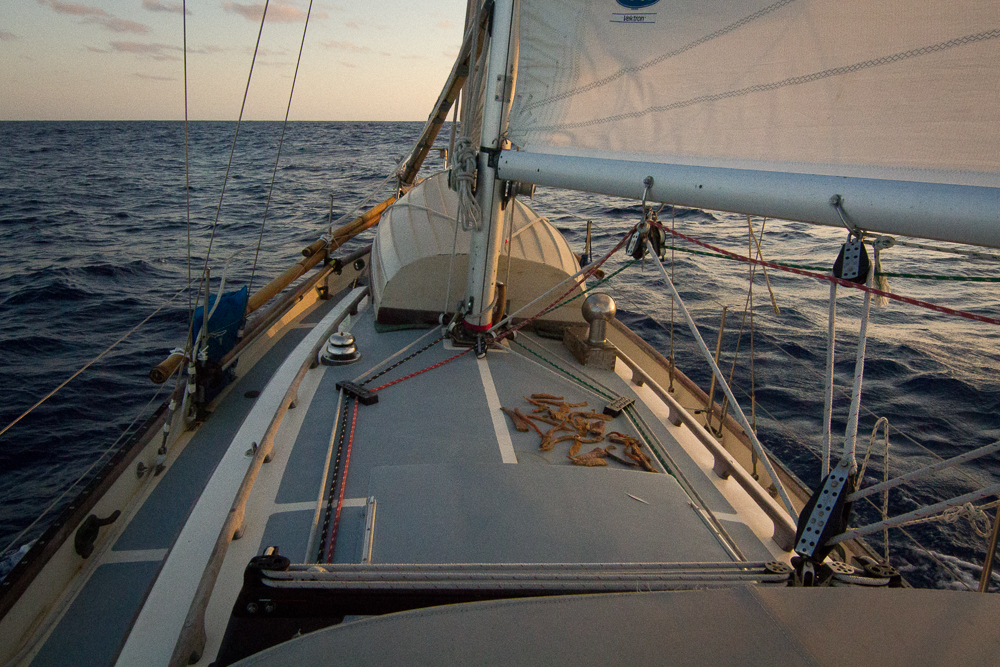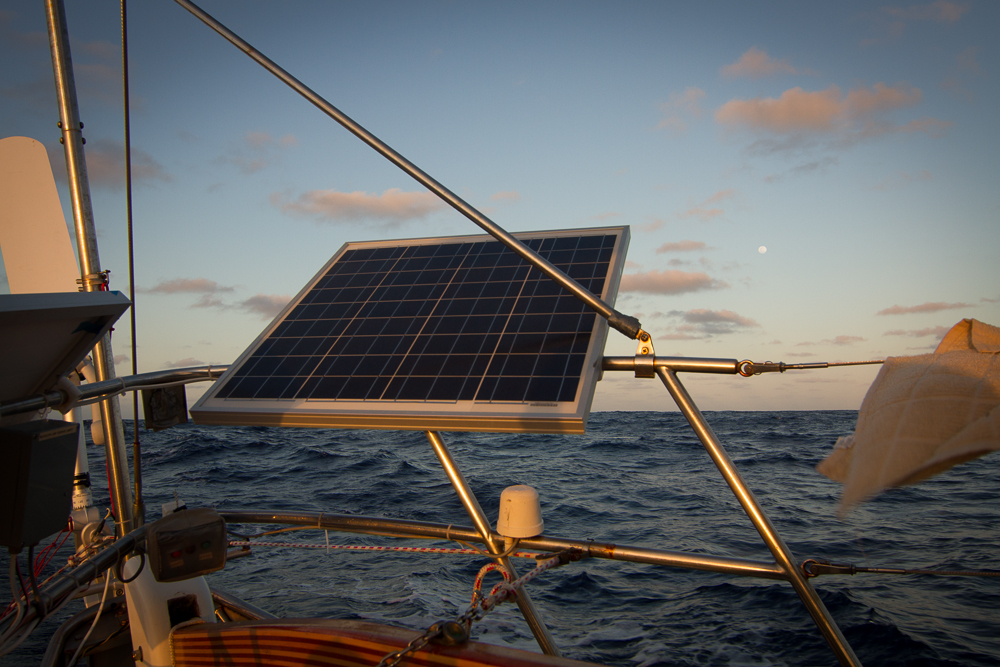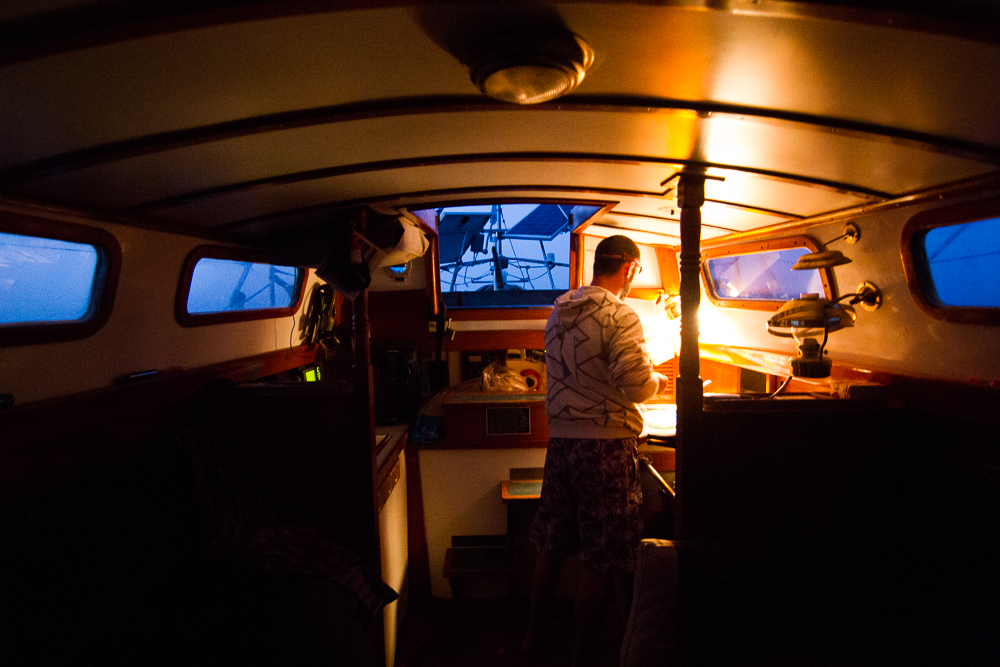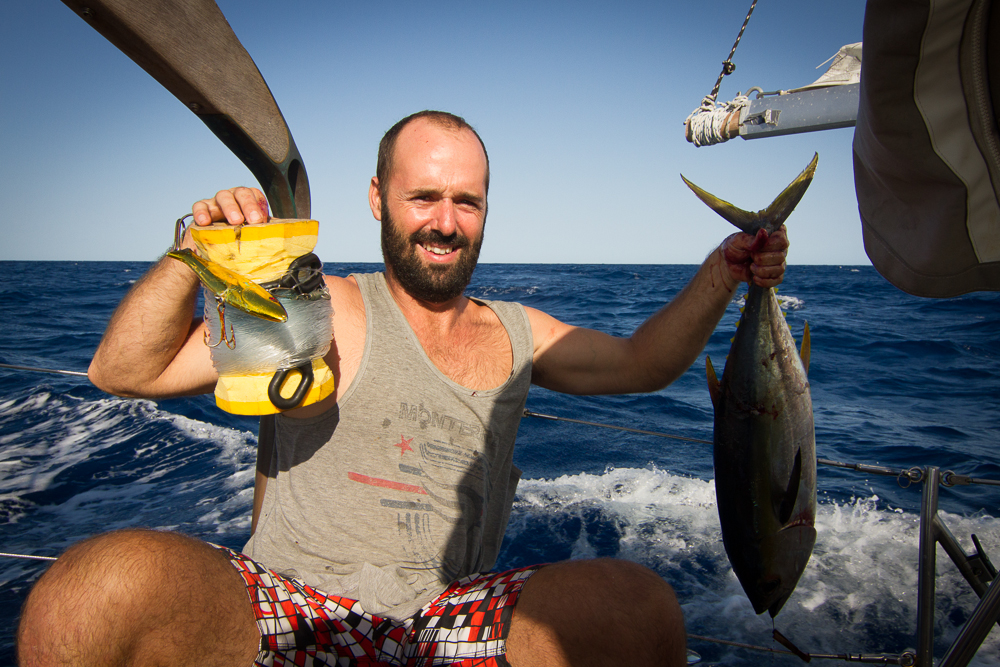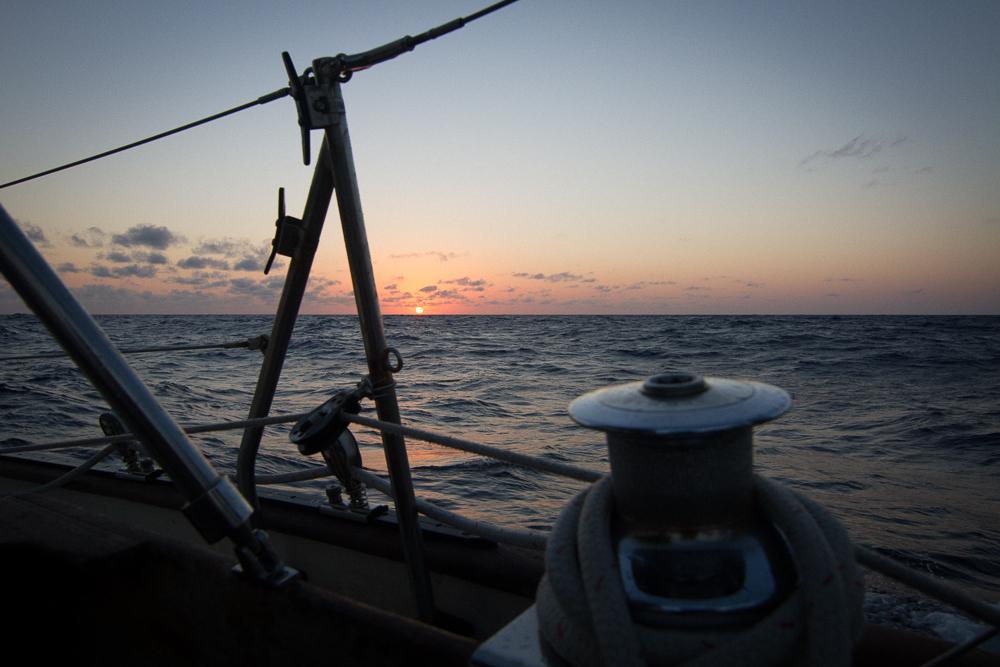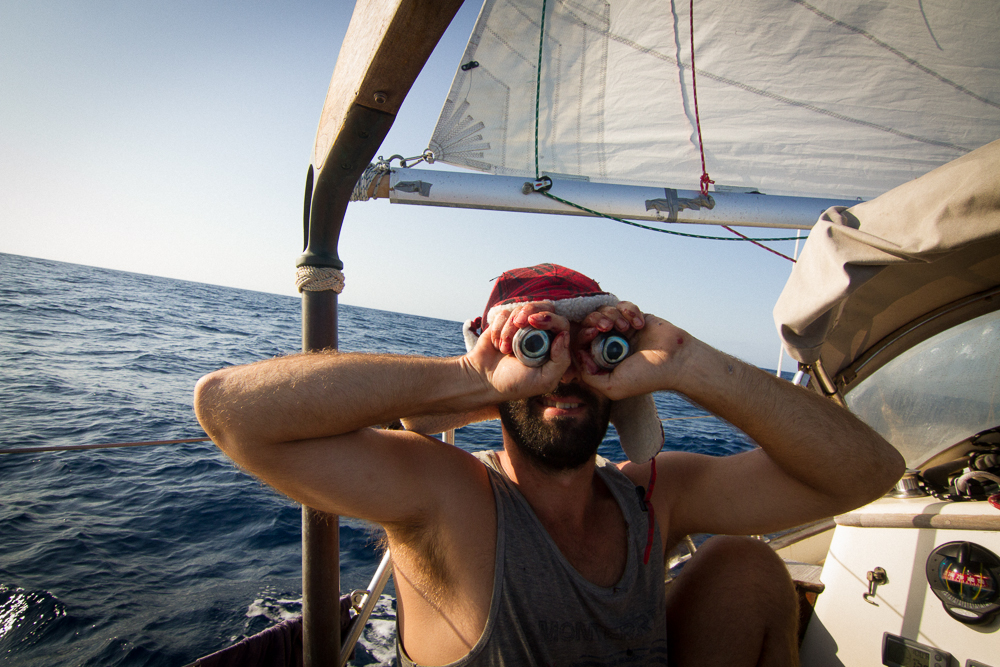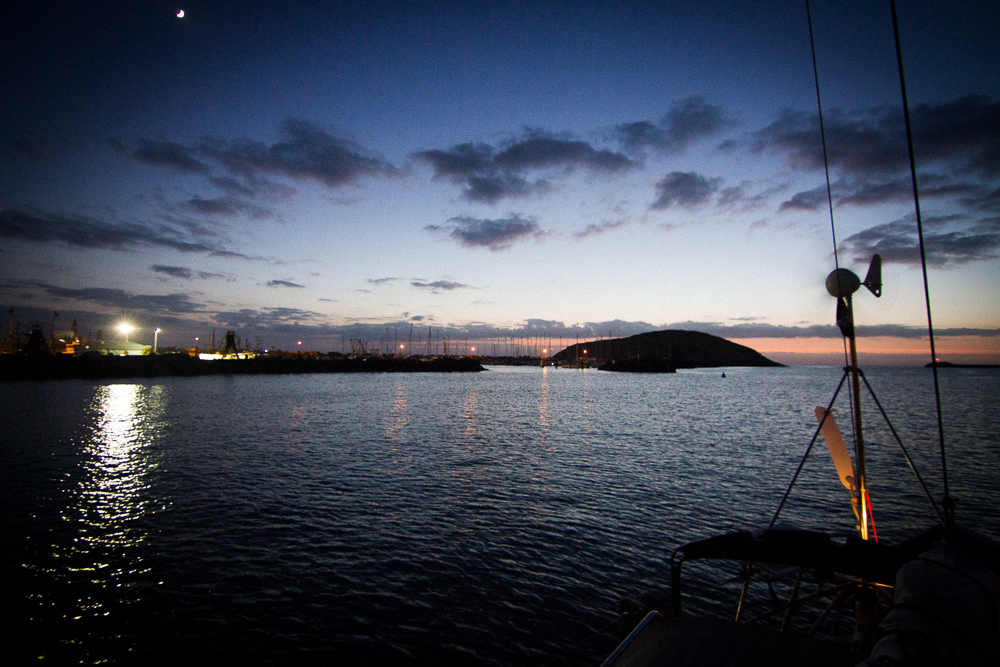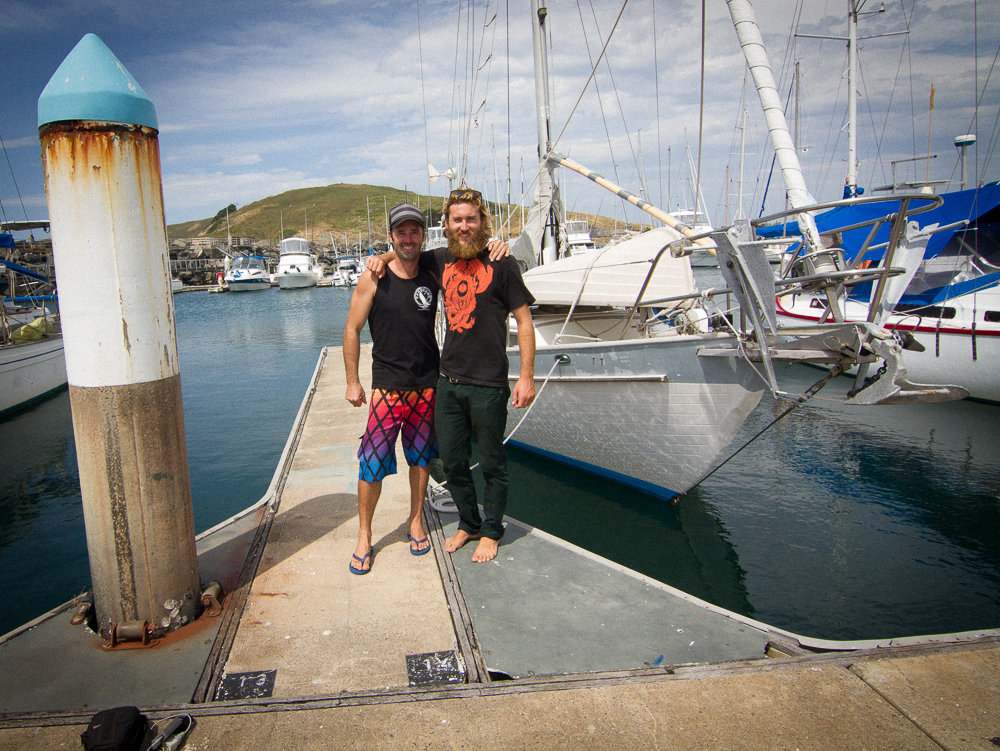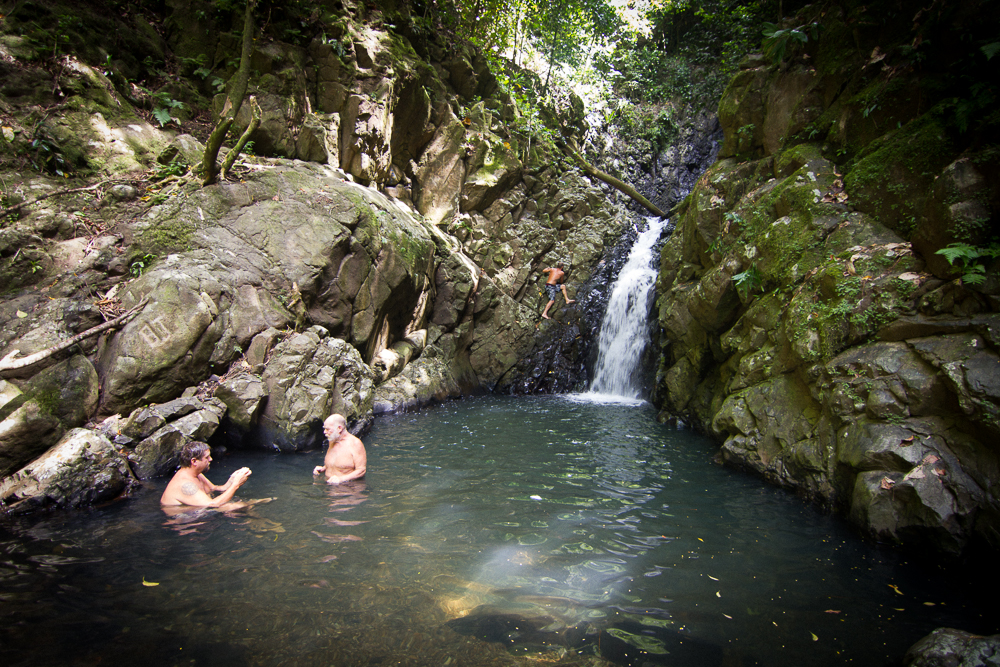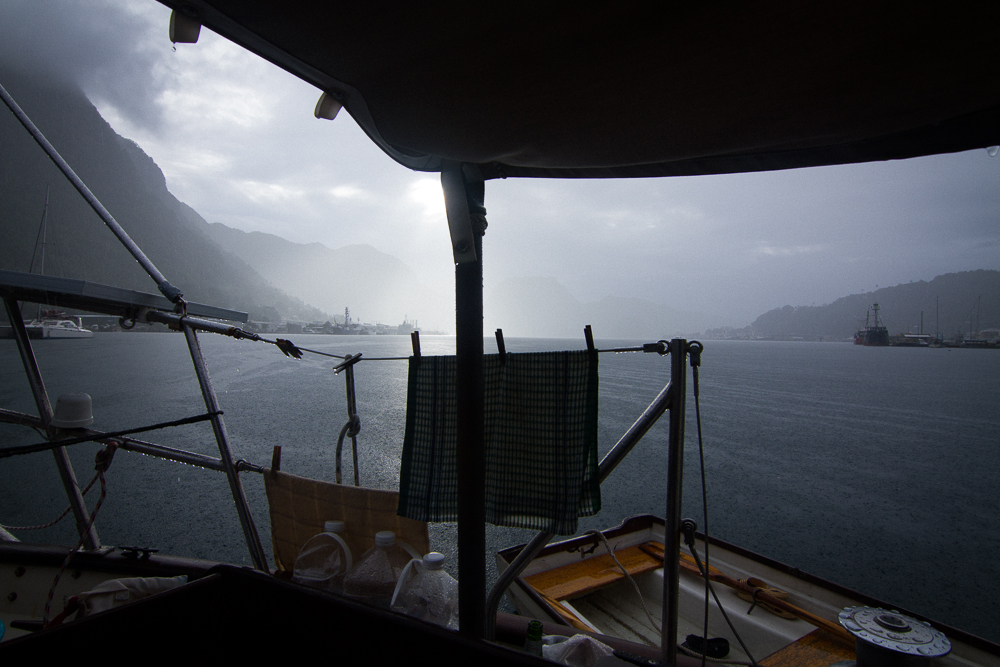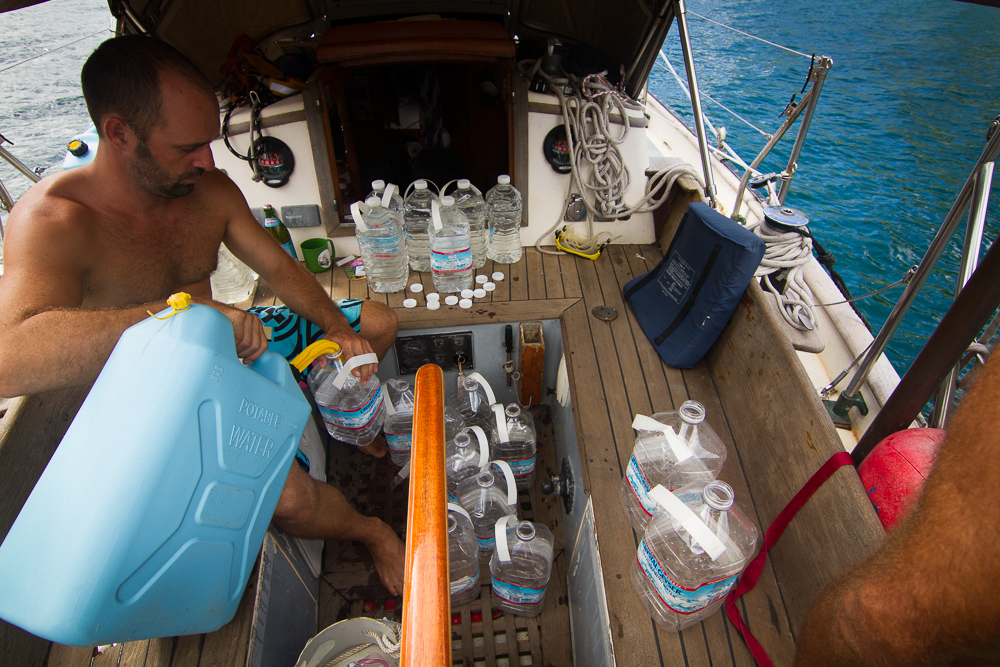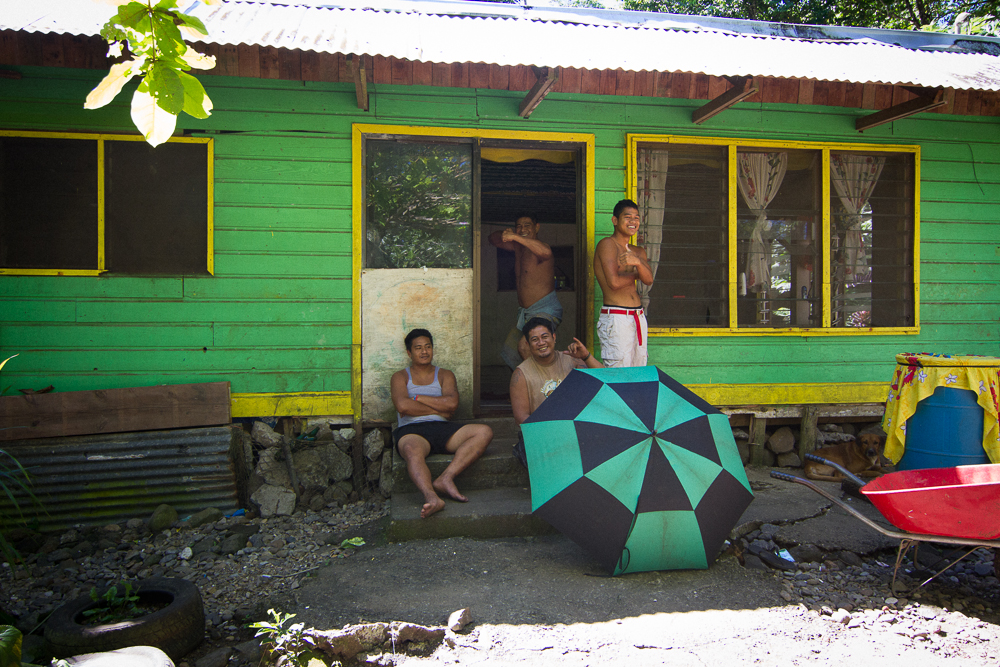American Samoa to Australia
15nm out of American Samoa, the wind died, and the sun set. The forecast showed zero wind for the next several days, and I was forced to start the engine or drift. I started up the engine at nightfall, and Chris attempted to sleep through the racket, as I sipped coffee and steered into the shore lights of Samoa. Everything happens slowly at sea, especially when it comes to making landfall. When in the deep ocean I have the odd sensation of feeling very safe, yet carry a deep underlying fear at the same time. Near land, my fear turns into pure anxiety and practicality - suddenly there are mistakes to be made where things can become very bad, very quickly. There are objects and signs of humanity to navigate around - both physically and metaphorically, as things become seemingly serious again. The dreamscape of an ocean fades to be replaced by the mixed joy and madness of civilisation rapidly appearing over the horizon.
Nearing the entrance into Pago Pago, the confusion of night compounds as our digital charts become more and more useless. Buoys don't correlate with our reported position, and breaking seas seem alarmingly close. I pull out of the entrance and circle around, as Chris pulls up another set of charts to navigate on. Finally things begin to make sense, as we pass big green markers with numbers matching the numbers Chris is yelling from the companionway.
To port the golden arches of McDonalds appear, and as we motor deeper into the large, protected harbour, we end up downwind to the SeaKist tuna cannery. Each landfall always has a unique smell. I recall rounding Cape Finisterre in Spain, to the smell of fish and woodsmoke, or the sweet smell of dirt and flowers while arriving into Western Samoa five years ago. This time it was a combination of fish oil, McDonalds cheese, and diesel fumes.
It was 6am and I hadn't slept all night. We dropped anchor, to be woken up at 7.30am by the sound of electronic church bells. Reluctantly waking up, Chris and I dropped the dinghy and rowed ashore for breakfast. With nothing but the McDonalds open, we found ourselves overlooking the harbour, drinking hot coffee and eating egg muffins in chilly air conditioning. Part of me was disgusted, yet another part of me secretly enjoyed the dry conditioned air and greasy food, after months of incessant equatorial heat and steamed rice.
We spent our days in American Samoa eating lots of bad food, as if to make up for lost time at sea. While rowing across the anchorage I bumped into an old friend I'd met years earlier in Tonga. He'd made the Pacific his home, and lived easily as an American citizen in the US owned island. We hung out, went to night markets and waterfalls, traveled around on colourful buses with large sound systems, and waited for good weather.
As the days meandered on, the smell of the cannery lessened, and Chris and I became increasingly bored. We were burning through what little cash reserves we had, and it was just one more ocean passage before we were home. Frustratingly the weather didn't want to cooperate. We waited and waited, slowly ticking off jobs each day, until we bit the bullet and left on a less than ideal forecast.
By late afternoon Samoa was but a distant island on the horizon. We'd amused ourselves for a couple of hours by sailing out of the anchorage. Making dozens of tacks from cannery to McDonalds and back until we were out. The weather was idyllic and we thought a nice easy night was in front of us to ease us into ocean life again. Unfortunately soon after nightfall we were reefed down and howling south by southwest.
Resting on watch, the radio came alive asking if we had a visual. Chris and I both flew out of the companionway to see another yacht less than a hundred meters off of our starboard side. While I stayed below shouting into the radio for them to veer away, Chris took the helm and pointed us hard to port. The vessel next to us refused to make course modifications, and I have no doubt that without taking action we would have collided.
The following week howled and we decided due to wind direction to sail over the top of Fiji. Passing over the top and down towards New Caledonia, light airs arose, and we began struggling for every mile. Some days we made less than 30nm, as we fought to knock miles of the large MILES TO GO numbers on our GPS readout.
As Chris fiddled with the shortwave radio receiver for news of the football grand final, I watched the GPS with a combination of delight and sadness. Another voyage was coming to a close as each minute passed, and I knew full well it was going to be a long time before another one would be on the horizon. Chris and I had spent hours and hours in the cockpit of Harmony talking about our next trips. Our next adventures. Our dreams. Being at sea is like having a license to dream big. The limitless horizon makes everything seem possible. On land there are a million obstacles right in front of our noses, physical or otherwise, which horizons simply don't render.
The meditative days of staring at waves on an infinite horizon were soon interrupted when Chris decided he wanted to get off the boat as soon as possible. We were headed to Sydney, but Coffs Harbour was our closest landfall. After all these days at sea, Chris didn't feel he could make another few days to Sydney, and so we headed for the entrance lights of Coffs Harbour, the port I had sailed into on my last voyage. As if to taunt us, the wind died again, and we lit the engine again for a long night at the helm, watching tiny lights become increasingly larger along the Australian east coast. By 4am, Harmony lay at anchor with her quarantine flag flying in a light northerly breeze. We'd done it. In less than three months, Chris and I had sailed a really long way, tackling broken booms, rudders, electrical storms, gales, dragging anchors, sharks and the insanity of equatorial doldrums.
At 9.30am we sat in the cockpit as Australian Customs & Quarantine read us our rights. Because of our change in arrival ports, we hadn't provided the mandatory 96hours arrival notice, and now faced hefty financial fines. I had a strong sense of deja vu, and I wondered why on earth I had decided to sail another boat into Australia. Each and every time it is fraught with nothing less than bureaucratic hell. Chris and I sat for an hour to questions about our whereabouts, our prior travels, and whether I had lived in Illawarra before. Customs & Quarantine had some kind of full personal report on each of us, and they prodded and pried to see whether we would lie and tell some kind of misinformation which didn't correlate with whatever file they were looking at. I was furious. After months of freedom and pure adventure pulsing through our veins, we listened to useless bureaucratic verbiage flow across the cabin, as I tried to focus my mind towards the distant shores of Suwarrow. I wanted to turn the boat around and head off to anywhere but home. I wanted to escape the cascading misery of bullshit which modern man continued to put up with through never-ending inertia... For all the modern wizardry and shoulders we stood upon to be here, my blood boiled at the lunacy of it all - the sharp change in experience from living life on the high seas to the madness of arrival was really just a bit much. But I calmly answered each and every question. I complied and played the game because there was nothing to hide...
My fury slowly diminished as I hired a broker to handle the importation of Harmony into Australia. A process which could have taken up to a month, involving complicated quarantine checks ended up taking less than 48 hours - it was a completely different experience to when I imported Constellation four years ago. My initial anger was soon replaced by joy - Harmony was imported, Chris and I were safe, the paperwork was all signed and delivered, and soon friends from Sydney flew up and generously treated me to lunches overlooking the harbour. Days later I was at my desk and it felt as if I'd never left.
It's extraordinary how uniquely adaptable we are - this adaptability being both a positive and negative trait. Without our immense ability to adapt, we wouldn't be able to go off and do ludicrous adventures in small boats, nor put up with the insanity of modern life - it's a double edged sword. And so today after a month and a half of city streets, it's life as usual: The sea is a distant memory, the phone rings, I field dumb questions, and tell the same stories over and over again. I'm enjoying the safety of life aboard land for now, away from a sea of endless abyss and the constant fear which is secretly relished...
It is the end of this chapter, with my dear boat Harmony already up for sale... But a great joy exists in the deepened knowledge that a moment at sea, is more real than a thousand moments in a world contrived by others.
